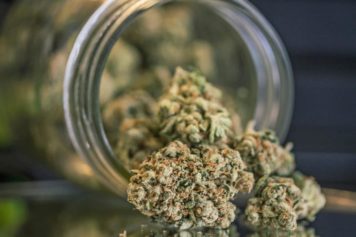Medical marijuana has been a non-starter in recent years in the Deep South, where many Republican lawmakers feared it could lead to widespread drug use and social ills. That now appears to be changing, with proposals to allow a form of medical marijuana gaining momentum in a handful of Southern states.
Twenty states and the District of Columbia have legalized medical marijuana, and this year powerful GOP lawmakers in Georgia and Alabama are backing bills that would allow for the limited use of cannabis oil by those with specific medical conditions.
Other Southern states are also weighing the issue with varying levels of support.
The key to swaying the hearts of conservative lawmakers has been stories of children suffering up to 100 seizures a day whose parents say they may benefit from access to cannabidiol, which would be administered orally. Proponents argue the cannabis oil is low in tetrahydrocannabinol or THC, the psychoactive compound in marijuana.
‘‘I’m an unlikely champion for this cause,’’ said Ga state Rep. Allen Peake, a businessman from Macon who attended the evangelical Dallas Theological Seminary. ‘‘Once people realize it’s not a 6-year-old smoking a joint, most folks realize this is the compassionate thing to do.’’
Peake’s bill has already earned the backing of more than 80 state lawmakers, including several members of the House Republican leadership, who signed on as co-sponsors, and the state’s largest professional association of doctors.
The bill would revive a dormant study program allowing universities to distribute medical cannabis and would be ‘‘limited in scope, tightly restricted, well regulated and managed by doctors,’’ he said.
Alabama Rep. Mike Ball, a retired hostage negotiator for the State Patrol, is behind a bill that would allow people to possess cannabis oil if they have certain medical conditions. It passed a key committee vote on Wednesday.
‘‘The public is starting to understand what this is,’’ said Ball, who chairs a House committee and is a prominent voice on law enforcement issues. ‘‘The political fear is shifting from what will happen if we pass it, to what might happen if we don’t,’’ Ball said.
The bills in Georgia and Alabama still have more vetting, and their prospects are not certain. But what is happening offers a strong signal of what is to come in other states.
In Louisiana, although a bill has yet to be introduced, a recent committee hearing at the Capitol on legalizing medical marijuana drew a standing-room-only crowd, and Gov. Bobby Jindal made comments last month indicating he was willing to consider it.
Technically, both Georgia and Louisiana have laws on the books from the 1980s and 1990s allowing for the use of medical marijuana, but those programs essentially ended before they could start when the federal government stopped delivery of legal cannabis.
Louisiana’s law allowed for glaucoma and cancer patients and those with spastic quadriplegia to get marijuana, but rules for the program were never developed.
In Mississippi, Republican state Sen. Josh Harkins is sponsoring a bill similar to those in Alabama and Georgia. Harkins said one of his constituents has a 20-month-old daughter with Dravet syndrome, a form of pediatric epilepsy, and the oil can help reduce the number of seizures.
Read more: Boston Globe


